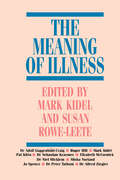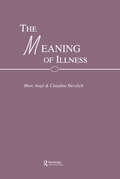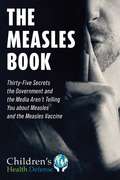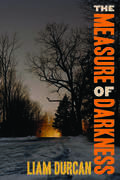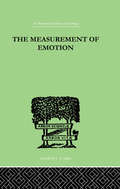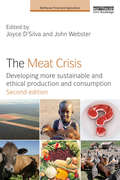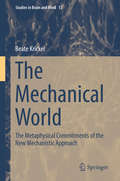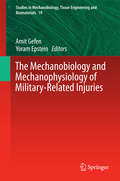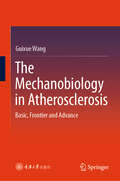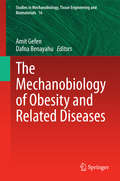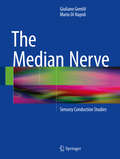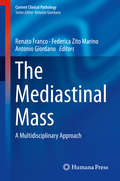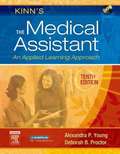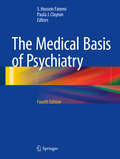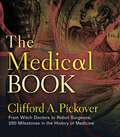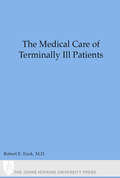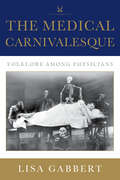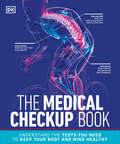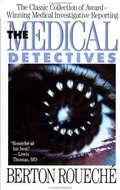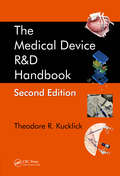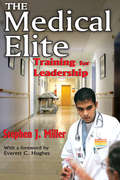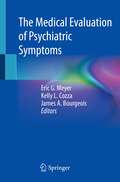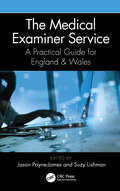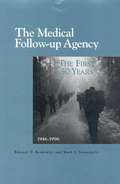- Table View
- List View
The Meaning of Illness
by Marc Auge Claudine HerzlichFirst Published in 1988. Routledge is an imprint of Taylor & Francis, an informa company.
The Meaning of Illness
by Marc Augé Claudine HerzlichThis book is based on collective research carried out during the 1980s. This edition appears ten years after the original publication in French. Since then we have experienced many changes. In the late decade, disciplines have changed, as have the societies being researched. The outbreak of AIDS in Africa and the industrial world is not the least of these major and influential changes. The reader today will be sensitive to these changes and this research maintains its value as an intellectual endeavour and a useful model.
The Measles Book: Thirty-Five Secrets the Government and the Media Aren't Telling You about Measles and the Measles Vaccine (Children’s Health Defense)
by Children's Health DefenseDiscover thirty-five secrets that the media, US government, and Big Pharma don't want you to know about vaccines. Measles! We all have seen or heard the scary stories about &“outbreaks&” in the media. It has even been declared a &“public health emergency&” at various times. Is it true? Are we and our children at risk? The Measles Book: Thirty-Five Secrets the Government and the Media Aren&’t Telling You about Measles and the Measles Vaccine will help you answer these questions. You will find out if this is just another example of the media, government, and industry misleading us or whether we really have a lot to worry about. The Measles Book presents reliable medical information from the most credible sources available. It is intended to help you make an informed choice about vaccinating your child. The main focus is measles, but many of the issues are relevant to other childhood vaccines. Within the book's pages, the reader will discover thirty-five secrets being kept from the general public about childhood vaccines, especially the measles vaccine. Just a sampling of these secrets include: Vaccines are not safe for every child and the government and pharmaceutical companies have known this for years.Some children will get injured or die from vaccines and the government and pharmaceutical companies know this, too.Pharmaceutical companies have developed an incredible way to make money from vaccines, and not be held accountable.When a child is injured or killed by a vaccine, the pharmaceutical company does not pay for the damage it caused—we do! Learn the other thirty-one secrets when you read The Measles Book by Children's Health Defense, a nonprofit organization committed to the health of our children and challenging misinformation spread by Big Pharma, the government, and the media. The information in The Measles Book is vital for parents to know so they can make informed decisions for their children.
The Measure of Darkness
by Liam Durcan"A deft exploration of the heart and mind that offers the pathos of a Sam Shepard play nested within the unreliable storytelling of Christopher Nolan's Memento." -Kirkus ReviewsMartin, an acclaimed architect, emerges from a coma after a roadside accident to find his world transformed: not only has the commission of a lifetime been taken from him, but his injury has left him with neglect syndrome, a loss of spatial awareness that has rendered him unfit to practice and unable to recognize the extent of his illness. Despite support from his formerly estranged brother and two grown daughters, his paranoia builds, alienating those closest to him. His only solace is found in the parallels he draws between himself and gifted Soviet-era architect Konstantin Melnikov, who survived Stalin's disfavor by retreating into obscurity. As Martin retraces Melnikov's life and his own fateful decisions, he becomes increasingly unsettled, until the discovery of the harrowing truth about the night of his accident hurtles him toward a deadly confrontation.A gripping journey into the depths of a fractured mind, The Measure of Darkness is ultimately a resonant tale of resilience and healing. Liam Durcan is the author of García's Heart, winner of the Arthur Ellis Best First Novel Award. He lives in Montreal, Quebec, where he works as a neurologist at McGill University.
The Measurement of Emotion (International Library Of Psychology Ser.)
by W Whately SmithFirst Published in 1999. Routledge is an imprint of Taylor & Francis, an informa company.
The Meat Crisis: Developing more Sustainable and Ethical Production and Consumption (Earthscan Food and Agriculture)
by John Webster Joyce D'SilvaMeat and dairy production and consumption are in crisis. Globally, 70 billion farm animals are used for food production every year. It is well accepted that livestock production is a major contributor to greenhouse gas emissions. The Food and Agriculture Organization of the United Nations (FAO) predicts a rough doubling of meat and milk consumption in the first half of the 21st century, with particularly rapid growth occurring in the developing economies of Asia. What will this mean for the health and wellbeing of those animals, of the people who consume ever larger quantities of animal products, and for the health of the planet itself? The new edition of this powerful and challenging book explores the impacts of the global growth in the production and consumption of meat and dairy, including cultural and health factors, and the implications of the likely intensification of farming for both small-scale producers and for animals. Several chapters explore the related environmental issues, from resource use of water, cereals and soya, to the impact of livestock production on global warming and issues concerning biodiversity, land use and the impacts of different farming systems on the environment. A final group of chapters addresses ethical and policy implications for the future of food and livestock production and consumption. Since the first edition, published in 2010, all chapters have been updated, three original chapters re-written and six new chapters added, with additional coverage of dietary effects of milk and meat, antibiotics in animal production, and the economic, political and ethical dimensions of meat consumption. The overall message is clearly that we must eat less meat to help secure a more sustainable and equitable world.
The Mechanical World: The Metaphysical Commitments of the New Mechanistic Approach (Studies in Brain and Mind #13)
by Beate KrickelThis monograph examines the metaphysical commitments of the new mechanistic philosophy, a way of thinking that has returned to center stage. It challenges a variant of reductionism with regard to higher-level phenomena, which has crystallized as a default position among these so-called New Mechanists. Furthermore, it opposes those philosophers who reject the possibility of interlevel causation. Contemporary philosophers believe that the explanation of scientific phenomena requires the discovery of relevant mechanisms. As a result, new mechanists are, in the main, concerned solely with epistemological questions. But, the author argues, their most central claims rely on metaphysical assumptions. Thus, they must also take into account metaphysics, a system of thought concerned with explaining the fundamental nature of being and the world around it. This branch of philosophy does indeed matter to the empirical sciences. The chapters investigate the nature of mechanisms, their components, and the ways in which they can bring about different phenomena. In addition, the author develops a novel account of causation in terms of activities. The analysis provides the basis for many further research projects on mechanisms and their relations to, for example, the mind-body problem, realization, multiple realization, natural kinds, causation, laws of nature, counterfactuals, and scientific levels.
The Mechanobiology and Mechanophysiology of Military-Related Injuries
by Amit Gefen Yoram EpsteinThis book provides a state-of-the-art update, as well as perspectives on future directions of research and clinical applications in the implementation of biomechanical and biophysical experimental, theoretical and computational models which are relevant to military medicine. Such experimental and modeling efforts are helpful, on the one hand, in understanding the aetiology, pathophysiology and dynamics of injury development and on the other hand in guiding the development of better equipment and protective gear or devices that should ultimately reduce the prevalence and incidence of injuries or lessen their hazardous effects. The book is useful for military-oriented biomedical engineers and medical physicists, as well as for military physiologists and other medical specialists who are interested in the science and technology implemented in modern investigations of military related injuries.
The Mechanobiology in Atherosclerosis: Basic, Frontier and Advance
by Guixue WangThis book is based on prior research conducted by the author's team, integrating the latest advancements in biomechanics and mechanobiology related to atherosclerosis from both domestic and international peers. It explores the mechanobiological mechanisms and prevention strategies for atherosclerosis and intravascular stent restenosis. The topics covered include: lipoprotein concentration polarization, stress response of vascular endothelial cells, biomechanical mechanisms in cardiovascular and cerebrovascular development, atherosclerotic plaque formation, in-stent restenosis, and post-stent implantation atherosclerosis. Additionally, the book presents the mechanobiological mechanisms of drug regulation for cell viability and inhibition of vascular restenosis, as well as the latest frontiers and advancements in these areas. It carries significant reference value for postgraduates and young researchers in cardiovascular physiology and pathology, particularly those involved in biomedical engineering, basic medicine, and clinical medicine focused on atherosclerotic disease research.
The Mechanobiology of Obesity and Related Diseases
by Amit Gefen Dafna BenayahuThis volume describes the state-of-knowledge in the study of the relationships between mechanical loading states in tissues and common pathophysiologies related to increase in mass of adipose tissues and/or hyperglycemia which eventually lead to obesity, diabetes, insulin resistance, hyperlipidemia, metabolic inflammations, certain types of cancer and other related diseases. There appears to be an interaction between the loading states in tissues and cells and these chronic conditions, as well as with factors such as age, gender and genetics of the individual. Bioengineering has made key contributions to this research field in providing technologies for cell biomechanics experimentation, microscopy and image processing, tissue engineering and multi-scale, multi-physics computational modeling. Topics at the frontier of this field of study include: the continuous monitoring of cell growth, proliferation and differentiation in response to mechanical factors such as stiffness of the extracellular matrix (ECM) and mechanical loads transferred through the ECM; mechanically-activated signaling pathways and molecular mechanisms; effects of different loading regimes and mechanical environments on differentiation fates of mesenchymal stem cells (MSCs) into myogenic and osteogenic versus adipogenic lineages; the interactions between nutrition and mechanotransduction; cell morphology, focal adhesion patterns and cytoskeletal remodeling changes in adipogenesis; activation of receptors related to diabetes by mechanical forces; brown and white adipose plasticity and its regulation by mechanical factors.
The Median Nerve
by Giuliano Gentili Mario Di NapoliThis atlas systematically reviews motor conduction studies of the median nerve, from pilot human studies in peripheral nerve conduction during the 1950s through to the most recent scientific evidence. Descriptions are provided of a wealth of motor nerve conduction techniques that were reproduced in the laboratory, including both the originally proposed methods and variants. The techniques are organized according to practical criteria for ease of reference. Attention is focused especially on those techniques which have shown higher sensitivity and specificity in the diagnosis of compressive mononeuropathies like carpal tunnel syndrome (CTS) and on the most widely accepted guidelines, recommendations, quality measures, and electrodiagnostic classifications. The volume is completed with a detailed, well-illustrated glossary explaining the more commonly used terms in electrodiagnostic medicine (EDX). The atlas is primarily intended for residents and professionals in Neurology, as well as rehabilitation physicians and clinical neurophysiologists. The detailed descriptions of techniques and their practical use will also make the book an invaluable tool for novices and clinical neurophysiology technicians.
The Mediastinal Mass: A Multidisciplinary Approach (Current Clinical Pathology)
by Antonio Giordano Renato Franco Federica Zito MarinoTumors of the mediastinum are usually diagnosed in young patients, but they can develop at any age and form any tissue that exists in or passes through the chest cavity. The diagnosis and the accurate assessment of the mediastinum masses represents a challenge, given their clinical variability from asymptomatic to producing symptoms of cough, chest pain, and dyspnea. Mediastinal tumors encompass a wide range of various neoplasms. The localization of mediastinal masses is critical in the diagnosis: the anterior mediastinal masses are generally thymomas, teratomas, substernal thyroid/parathyroid tissue, or lymphomas; the middle mediastinum massess are typically pericardial and bronchogenic cysts; the posterior mediastinum masses are often neurogenic tumors and esophageal cysts. The wide variety of different entities demonstrates a heterogeneous spectrum of clinical and pathologic features, suggesting that a uniform “standard” management of these patients is not appropriate. In this context, the proposed book will provide a comprehensive review of the mediastinal tumors according to different sites of the diseases, including the masses of anterior, middle and posterior mediastinum. The handling of these tumors requires a multidisciplinary approach due to the complex anatomy of the mediastinum as well as the different clinical, radiographic, and prognostic features. This book has risen from the desire to provide to the specialists in the field an easy, updated and practical guidelines title to facilitate the clinical practice of mediastinic masses. This book will be a comprehensive guide to clinical best practices developed through the opinions of experts in the field.
The Medical Assistant: An Applied Learning Approach
by Alexandra Patricia Young Deborah B. ProctorFor this tenth edition of a text/CD-ROM package, Young (Everest College-Arlington Midcities) and Proctor (director, medical assisting program, Butler County Community College) incorporate an approach that is reflected in the book's subtitle: an applied learning approach. There is new information on procedures for managing an office, and new material on how the HIPAA Privacy Rule benefits the healthcare industry and the patient. Also new to this edition is the integration of administrative concepts into discussions on the various diseases and conditions within each medical specialty. This feature is intended to transcend the traditional separation of administrative and clinical topics. Each clinical specialty chapter has been revised, with expanded focus on medical terminology, anatomy and physiology, and pathophysiology. The CD-ROM contains scenarios and questions, anatomy and physiology animations, and a demo derived from a medical office software program, allowing students to practice front office skills. Annotation ©2008 Book News, Inc. , Portland, OR (booknews. com)
The Medical Assistant: An Applied Learning Approach (9th Edition)
by Alexandra Patricia Young Debora B. KennedyThis leading, well-established textbook covers the administrative and clinical skills all medical assistants need to know, integrating all of the topics and skills competencies required by the AAMA entry-level Medical Assisting Curriculum. It features chapter outlines and learning objectives as well as relevant material dealing with personal qualities, skills, responsibilities, types of patient education, and legal and ethical issues. The unique Kinn approach - teaching essential skills alongside the medical specialty context - is the signature feature of this book. In addition, the 9th edition introduces a new "applied learning approach" that focuses on a real-world context for skills and requires the student to apply theory and skills to various case studies throughout the chapters.
The Medical Basis of Psychiatry
by S. Hossein Fatemi Paula J. ClaytonFour years have passed since the last edition (3rd) of this book was published. In the intervening years, several reviews of this book have provided highly encouraging remarks about the value of this book in transmitting information on classification and treatment of psychiatric disorders to the audience. We are proposing to revise all chapters with an eye on accuracy and ease of use, and this is an especially timely endeavor with the upcoming publication of the Diagnostic and Statistical Manual V. All the appropriate new information on biology, etiology, diagnosis and treatment of psychiatric disorders will be added to the current proposed edition. It is our goal to recruit the same authors (if possible) who contributed to the previous edition. While all chapters will be updated (see TOC), those marked by asterisks will be the most likely to undergo more revision. Psychiatry has emerged as a burgeoning scientific field with major advances in etiology and treatment of several disorders. Just as there was excitement in the anatomic advances that took place a hundred years ago when Emil Kraepelin and his collaborators took on the enormous task of classification of psychiatric disorders based on rational scientific thinking, new advances in genetics, biochemistry, neuroanatomy and pharmacotherapy of mental disorders have brought us even closer to a better understanding of complex disorders like schizophrenia, bipolar disorder, depression and even autism. The major goal of the previous edition of this classic book was to update the busy clinician, psychiatric resident and medical student with the most up-to-date information on etiology, diagnosis and treatment of psychiatric disorders. This goal remains the focus of the fourth edition of this book. In this updated and expanded edition, the reader will be provided with the most contemporary information and literature supported by a close survey of the field. This new edition of this classic title, with its focus on biologic and medical aspects of psychiatry, will continue to be of significant help to all interested in the scientific practice of psychiatry.
The Medical Book: From Witch Doctors to Robot Surgeons, 250 Milestones in the History of Medicine (Union Square & Co. Milestones)
by Clifford A. PickoverFollowing his hugely successful The Math Book and The Physics Book, Clifford Pickover now chronicles the advancement of medicine in 250 entertaining, illustrated landmark events. Touching on such diverse subspecialties as genetics, pharmacology, neurology, sexology, and immunology, Pickover intersperses “obvious” historical milestones--the Hippocratic Oath, general anesthesia, the Human Genome Project--with unexpected and intriguing topics like “truth serum,” the use of cocaine in eye surgery, and face transplants.
The Medical Care of Terminally Ill Patients (The Johns Hopkins Series in Hematology/Oncology)
by Robert E. EnckSince the publication of the first edition of The Medical Care of Terminally Ill Patients, the field of palliative care has progressed significantly, both socially and scientifically. In this new edition, Dr. Robert Enck reviews the results of clinical studies devoted to the care of dying patients. Special attention is given to pain management, management of symptoms, care of advanced cancer patients, and care of patients with nonmalignant diseases. More than 100 new references, a new list of abbreviations, and tables with new drugs and dosages provides valuable information.Dr. Enck places great emphasis on enhancing the quality of life while addressing the most common symptoms of terminal illness.
The Medical Carnivalesque: Folklore among Physicians
by Lisa GabbertThe practice of medicine is immersed in issues of life, death, and suffering in relation to the mortal body. Because of this, the medical profession is a fertile arena for folklore that serves to address these topics among physicians.In The Medical Carnivalesque, Lisa Gabbert argues that this extraordinarily difficult work context has led to the development of an occupational corpus of folklore, backstage talk, and humor that she calls the medical carnivalesque. Gabbert argues that suffering is not only something experienced by patients, but that the organization, practice, and ethos of medicine can induce suffering in physicians themselves. Featuring topics such as the institutionalized nature of physician suffering, death-related humor and talk, stories about patient bodies, and parodies of medical specialties, The Medical Carnivalesque shows us how the culture of contemporary medicine uses travesty, humor, and inversion to address the sometimes painful and often transgressive aspects of doctoring. The Medical Carnivalesque connects patient and physician suffering to laughter; acknowledges suffering as an essential component of life; and constitutes a way in which some physicians address the core philosophical and existential issues with which they regularly engage as they go about their daily work.
The Medical Checkup Book (DK Medical Care Guides)
by DKWritten by experts and packed with user-friendly information and practical lifestyle advice, this is the ultimate guide for anyone interested in their health. Knowing which health checks and tests to get when can prevent illness and problems, and even save your life. This easy-to-use guide explains all the common health tests so that you can understand and manage your well-being. When you've had a physical, how often do you understand what the results really mean for your health and your lifestyle? You've probably heard of good cholesterol and bad cholesterol, but what does that mean? And what can you do if you're told your bad cholesterol is high? Why are there two figures to show your blood pressure? Is weight gain hereditary? Be proactive in managing your health by learning more about how it is measured. Discover what factors influence medical tests, and what lifestyle changes you can make to keep fit and healthy for longer. Explore the variety of tests and screenings you may undergo at a doctor's or workplace health assessment - find out what is tested, why it is tested, and what the results mean.The Medical Checkup Book is the only visual guide to explain all common medical tests and what preventative measures you can take to minimize the risks and maximize your health.
The Medical Detectives: The Classic Collection of Award-Winning Medical Investigative Reporting
by Berton Roueche Berton Rouche<p>What do Lyme’s disease in Long Island, a pig from New Jersey, and am amateur pianist have in common? All are subjects in three of 24 utterly fascinating tales of strange illnesses, rare diseases, poisons, and parasites—each tale a thriller of medical suspense by the incomparable Berton Roueché. The best of his New Yorker articles are collected here to astound readers with intriguing tales of epidemics in America’s small towns, threats of contagion in our biggest cities, even bubonic plague in a peaceful urban park. <p>In each true story, local health authorities and epidemiologists race against time to find the clue to an unknown and possibly fatal disease. Sometimes a life hangs in the balance, and the culprit may be as innocuous as a bowl of oatmeal. Award-winning journalist Berton Roueché is unfailingly exact, informative, and able to keep anyone reading till dawn.</p>
The Medical Device R&D Handbook
by Theodore R. KucklickExploring the practical, entrepreneurial, and historical aspects of medical device development, this second edition of The Medical Device R&D Handbook provides a how-to guide for medical device product development. The book offers knowledge of practical skills such as prototyping, plastics selection, and catheter construction, allowing designer
The Medical Elite: Training for Leadership
by Stephen MillerIn the tradition of C. Wright Mills, Stephen J. Miller defines and analyzes the power of the medical elite in American elite. He describes a group of interns who are becoming the successors of the physicians who determine the character of medicine in a complex society. The group is at the Harvard Medical Unit of the Boston City Hospital, and its members are heirs apparent to the elite of the medical profession.Miller spent more than a year living with these interns. He observed them as they worked on the wards, in clinics, and on the accident floor. He interviewed interns, administrators, teachers, researchers, and other personnel at the university-affiliated hospital. He describes how members of the elite are chosen and promoted, discusses what makes them elite, and demonstrates how they maintain their elite status. In the course of his analysis he describes fully the training of these young physicians and how their internship prepares them for the future role in medicine. The thrust of the book is to document the training of interns in a big-city hospital and to describe the operations and self-perpetuating tactics of elite.The best or the elite of the medical profession, explains Miller, are teachers and researchers at medical schools and particularly those at "name" schools and their affiliated hospitals. More than half of those who served in the internship program went on to become professors, deans, chairmen, and administrators in those institutions. The author describes how interns serve the purpose of the elite they may someday join: they provide the bulk of the medical care at the hospital and, by so doing, free the researchers so that they are able to spend more time in the laboratory. While much of what interns do is everyday tasks of caring for patients, those who serve such internships are taking the first step on a route that leads to membership in the medical elite
The Medical Evaluation of Psychiatric Symptoms
by James A. Bourgeois Eric G. Meyer Kelly L. CozzaEvery DSM-5 diagnosis includes an exclusion criterion that the disorder is not better explained by a medical condition. Meeting this criterion can be difficult for a variety of reasons. The psychiatric signs and symptoms of medical disorders are not commonly emphasized in medical textbooks. Further, illness scripts for medical diagnoses do not often overlap with psychiatric disorders, making it difficult to know what medical conditions should be ruled out. For example, irritability is a common symptom in polycystic ovarian disorder, but PCOS is rarely on the differential for irritability. Similarly, while hypothyroidism is commonly linked to the illness script of depression, patients with MDD may be just as likely to have diabetes - an infrequently considered diagnosis for depression. “Buzzword” medical conditions that are commonly prioritized in medical student training can negatively influence classic illness scripts. While such diagnostic possibilities make for good multiple-choice questions, they are frequently rare and may inadvertently undermine important common possibilities. For example, a patient with chest pain in the context of anxiety is more likely to have asthma, acute coronary syndrome, or even a pulmonary embolism than pheochromocytoma. In a recent white paper issued by the American Psychiatric Association, it has urged psychiatrists to better advocate for patients with severe mental illness who often lack access to primary care. But some psychiatrists may be unfamiliar with physical exam maneuvers and medical review of systems (ROS) questions. Complex medical systems may delegate the physical exam to physicians outside of psychiatry, or there may be a temptation to rely on the emergency room’s “medical clearance” as a “medical rule-out.” Both can result in decreased familiarity with physical exam techniques previously mastered as part of medical school. A cursory review of the physical exam maneuvers and concise symptom-based medical ROS lists can alleviate some of these concerns. This book is intended to provide psychiatrists and physicians who routinely evaluate psychiatric symptoms with the tools needed to rule out medical conditions that could be causing those symptoms. It will start with an introduction that reviews why the text is needed and potential larger gaps in training that might contribute to the necessity for such a text. Each chapter thereafter will focus on a specific symptom. Each symptom will be defined to ensure accuracy. Then a differential of common medical conditions that can cause that psychiatric symptom will be provided. For each diagnosis key history, physical exam, laboratory, and radiologic findings will be provided that help rule the condition out. Screening tools that can help rule out medical etiologies will also be provided. Where available, positive predictive values (PPVs) will be provided to help users understand the likelihood that a negative finding or result indicated that a medical disorder is not present. While individual aspects of this text exist in other formats, the comprehensive nature of our approach, descriptions of psychiatric symptoms to means of ruling out potential medical etiologies, is not currently available to providers. This text will assist providers in ruling out medical etiologies of common psychiatric symptoms, ensuring patients are diagnosed correctly. Such an improvement has the potential to dramatically improve patient outcomes.
The Medical Examiner Service: A Practical Guide for England and Wales
by Jason Payne-James Suzy LishmanThis book provides a practical guide for all those working in or with Medical Examiner Services in England and Wales. It is an adjunct to the e-learning and face-to-face training required to fulfil the Medical Examiner and Medical Examiner Officer roles. Medical Examiner Services also work closely with a wide range of stakeholders including bereavement and mortuary teams, Coroners and their Officers, Registrars, Funeral Directors and those working in clinical governance and patient safety. This book provides an essential overview of all aspects of the Medical Examiner system for anyone working in these areas, or in any aspect of the support and management of the deceased and bereaved. A concise guide including the knowledge base required to develop and run a Medical Examiner Service Content is completely aligned with required training Written by those with direct experience of establishing and working with Medical Examiner Services Relevant to a wide range of stakeholders who work with patients and the bereaved
The Medical Follow-up Agency: The First Fifty Years 1946-1996
by Edward D. BerkowitzThe National Academies Press (NAP)--publisher for the National Academies--publishes more than 200 books a year offering the most authoritative views, definitive information, and groundbreaking recommendations on a wide range of topics in science, engineering, and health. Our books are unique in that they are authored by the nation's leading experts in every scientific field.
